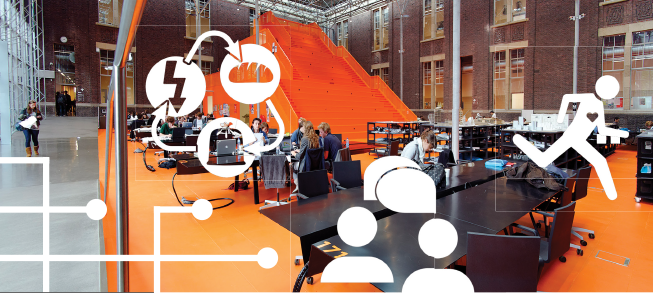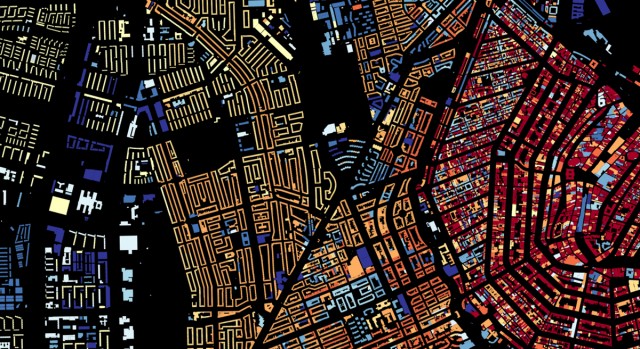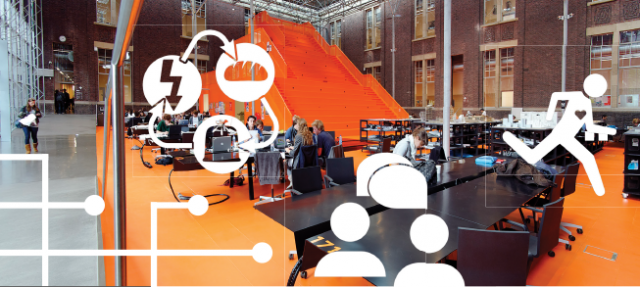
2017 Summer School
Making the Metropolis
Exploring Interdisciplinary Approaches in Design Engineering
The Amsterdam Institute for Advanced Metropolitan Solutions (AMS), the Delft Deltas, Infrastructures & Mobility Initiative (DIMI), and the International Forum on Urbanism (IFoU) join Delft University of Technology in the organisation of the interdisciplinary 2017 Summer School: ‘Making the Metropolis’.



When: From 22 to 30 August 2017
Where: Delft University of Technology, The Netherlands
with workshops and fieldwork in Amsterdam
Theme: The connected, vital, and circular city
Partners: Amsterdam Institute for Advanced Metropolitan Solutions (AMS)
Delft Deltas, Infrastructures & Mobility Initiative (DIMI)
International Forum on Urbanism (IFoU)
Delft University of Technology, Faculty of Architecture and the Built Environment (TUD)
Target Group: 60 Master Students in Architecture, Urban Design and Planning, Environmental Design and Sciences, Landscape Architecture, Transport, Infrastructure and Logistics, and related disciplines, particularly from IFoU institutions.
What you will challenge
By participating this summer school, you explore interdisciplinary approaches in metropolitan design engineering through the analytical approaches which you share with others. While working in interdisciplinary and intercultural groups, you will challenge the world’s globalisation processes: How to keep our cities connected and vital. How to develop integral solutions for urgent societal problems related to vital infrastructure for water safety and smart mobility? How to accomplish sustainable answers on these questions? And, how to aim for a circular city simultaneously? By using Amsterdam as test-bed and design location, you apply and highlights strategies to a practical implementation of sustainable solutions.
“Today’s revolution of new technologies, theories and methods are making advanced metropolitan solutions possible, but no single actor or stakeholder can make metropoles move in a specific direction. Metropolitan solutions require cooperation between knowledge institutes, companies and governments, as well as between cities, citizens and civil society.”
In this summer school, you will span disciplinary boundaries and test lessons learned at the home institution by focussing on cross-over themes. You will collaborate in teams; An approach, which is motivated by the observation that an increasing amount of disciplines focus on the city and need to work together. It seems a matter of course, as more and more people live in cities, an increasing amount of people are engaged with the city like you. This includes both the number of professionals, and the amount of professions. For instance, from economists and social scientist to agriculturalist and biologists, in all cases senses shift along. All are putting a light on the metropolis too. We see the shift most explicitly in the traditional design professions in the built environment. Of all disciplines, a growing variety of specialists are engineering designs collaboratively. Disciplines work together in order to facilitate the urbanisation processes and upgrade the fabric. Architects, urban designers and planners, environmental designers and scientists, landscape architects, and for example experts involved in transport, infrastructure and logistics, all have to work together in improving the metropolis. This summer school brings you, as one of them, in connection with other designers for the physical environment. Being all co-creators of the metropolis, jointly you explore shared ways of doing: Internationally and interdisciplinary. It will be a major step towards your future practice – no matter what you will do – facing a larger majority of the world population living in urbanised areas. From the sustainable understanding of the globalisation challenges, you explore what to design if we approach ongoing urbanisation from multiple viewpoints at the same time.
What will you bring in to keep our cities fit for the future?
How you will work
The ‘Making the Metropolis’ Summer School is organised in a studio-setting. The studios create an interactive setting for you, facilitating disciplinary exchange. Participants are distributed over 5 sub-groups related to major challenges in the Connected, Vital and Circular City. Each group aims to have 12 members and will be composed interdisciplinary and internationally. As part of one of these groups, you are supervised by at least one Delft professor as well as one appointed professor of a participating institution. Together with the other participants, you will develop design proposals, supported by fieldwork, lectures in seminar setting, and plenary mid-term and final presentations.
Within the subgroups, you will focus on either:
The Connected City
- Mobility, Transport, Infrastructure and Logistics
- Metropolitan Development and its Water Network
The Vital City
- Social Interaction and Urban Culture
- Urban Functions and Activities: Health and Well-Being
The Circular City
- Resource Security in Cities: Energy, Food, Waste
What you will learn
This summer school is built upon the expertise of the Amsterdam Institute for Advanced Metropolitan Solutions (AMS) and the Delft Deltas, Infrastructures & Mobility Initiative (DIMI), within the wider academic network of the International Forum on Urbanism (IFoU). Participating in the ‘Making the Metropolis’ Summer School will advance the adaptability of your own knowledge and skills related to interdisciplinary challenges in the sustainable metropolis.
Adaptability
- You advance adaptability of and disciplinary knowledge
- You are able to evaluate on own skills in communicating and working with others
Interdisciplinary
- You know the key effects of global urbanisation on disciplines active in the built environment
- You are able to apply multi-disciplinary approaches in the design of the metropolis
Sustainability
- You understand the fundamental challenges in the Connected, Vital and Circular City
- You are able to create interdisciplinary answers to these challenges
| Main Venture in Delft | On Site Events |
| Delft University of Technology
Faculty of Architecture and the Built Environment Julianalaan 134 2628 BL Delft |
Amsterdam Institute for Advanced Metropolitan Solutions
at Royal Tropical Institute in Amsterdam Mauritskade 62 1092 AD Amsterdam |
Registration & costs
Costs: € 200,- (field excursions, lectures, materials, lunch)*
*) Master Students in Architecture, Urban Design and Planning, Environmental Design and Sciences, Landscape Architecture, Transport, Infrastructure and Logistics, from IFoU member institutions, Delft University of Technology, Wageningen UR and MIT Boston can participate free of charge.
NB: After the confirmation of acceptance, you will receive an invoice. Course fees need to be paid three weeks before the start of the programme. Fees do not include accommodation and commuting expenses. Upon request, you will receive an list with recommended hostels and hotels. All participants also cover flight tickets and visa costs themselves.
In case you need of a personal invitation letter for your visa application or any travel permit, please feel free to contact us and we will provide you with the necessary documentation.
Find out which countries need a visa here <https://ind.nl/en/short-stay>. For further information on visa procedures for the Netherlands, click here <https://ind.nl/en/short-stay>.
Deadline for registration: July 1st 2017.
Send your application to dr. Diego Sepulveda Carmona: D.A.SepulvedaCarmona@tudelft.nl
Application for the Summer School ’Making the Metropolis’ includes the following information
Full name
Email address
Mobile number
University
Faculty
Study programme (incl. field of discipline)
*Student registration number
And a motivation letter (100 words) & CV.
Admission will be based on evaluation of CV and motivation letter. Application is possible till July 1st 2017, shortly after this date you will hear if you are granted to participate.
Questions? Contact
dr. Diego Sepulveda Carmona: D.A.SepulvedaCarmona@tudelft.nl
More Information
Amsterdam Institute for Advanced Metropolitan Solutions (AMS): <www.ams-institute.org>
Delft Deltas, Infrastructures & Mobility Initiative (DIMI): <www.infrastructures.tudelft.nl>
International Forum on Urbanism (IFoU): <www.ifou.org>
Delft University of Technology, Faculty of Architecture and the Built Environment (TUD): < http://www.bk.tudelft.nl/en/about-faculty/the-building>
Organising Committee
dr ir Maurice Harteveld, dr ir Roberto Cavallo, dr Diego Sepulveda Carmona, dr Lei Qu
